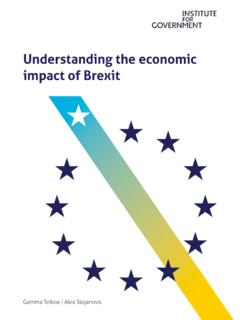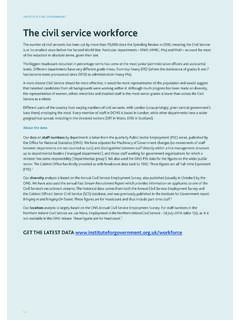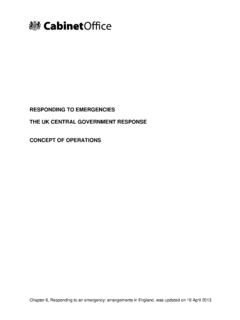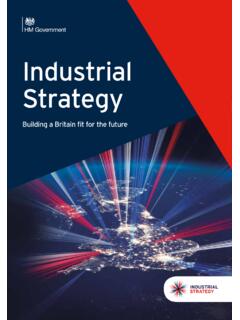Transcription of Economic impacts and policy response - The Institute for ...
1 IfG INSIGHT | DECEMBER 2020. brexit and coronavirus Economic impacts and policy response Gemma Tetlow and Thomas Pope Summary The UK economy has been hit hard by the coronavirus pandemic and any recovery has been delayed by a winter resurgence of the virus and renewed public health restrictions. More Economic headwinds are on the horizon with the end of the brexit transition period, at 11pm on 31 December 2020. Even though the UK and the European Union have managed to reach an agreement on a future trade deal, the UK's relationship with its main trading partner will change This is likely to lead to disruption at the start of 2021 as well as longer-term Economic effects.
2 Dealing with either of these shocks in isolation would be difficult for businesses. Dealing with both will be even harder. Businesses devoted time and resources in 2020 to finding ways to keep afloat despite the pandemic. This has left them with less time to focus on preparing for the end of the transition and financially weakened as they try to weather the short-term disruption and adjust to the long-term consequences of the UK leaving the EU. brexit and coronavirus are two shocks that are almost perfectly designed to substantially affect the entire UK economy. brexit has and will continue to affect most of those sectors that rely on cross-border trade with the EU.
3 Meanwhile, coronavirus has most affected non-tradeable services those that rely on face-to-face contact. This means that few sectors escape unscathed: we estimate that 69% of the economy is badly affected by at least one of coronavirus and brexit . 1 brexit AND CORONAVIRUS. Rishi Sunak, the chancellor, has rolled out a raft of Covid measures from wage subsidies to cheap business loans to help businesses and households weather a severe but temporary shock. These policies will remain in place in 2021 and so could be used by businesses to help them cope with the effects of brexit too when the transition period ends. However, these policies are not well-designed to help businesses adjust to brexit .
4 While coronavirus is predominantly a sharp but temporary shock to the economy, the UK's new trading relationship with the EU will not only create some short-term disruption, as the new systems are put into place, but will also permanently alter many businesses' costs and their international competitiveness. To avoid wasting taxpayer money, we recommend that the government restrict access to coronavirus support schemes to only those businesses affected by that shock. To help businesses cope with the short-term brexit disruption, the government should either design an alternative package of support or allow those businesses special access to the existing Covid-19 schemes on a case-by-case basis.
5 Though trying to limit access to the schemes in this way will be politically very difficult, failing to do so risks poor value for taxpayer money and longer-term Economic damage from delaying necessary Economic restructuring. There are four ways in which the government could target Covid support more narrowly: closing schemes early; restricting access to schemes to those who have already applied;. imposing stricter eligibility requirements; and providing different support to different sectors. Schemes designed to support businesses through short-term brexit disruption should include government-backed loans ideally these would be on less generous terms than those provided for coronavirus, although it may be quicker and easier simply to extend those existing schemes and further tax deferrals.
6 More bespoke intervention akin to that planned under Operation Kingfisher' in the event of no deal in 2019 may also be appropriate. In practice, the government may find it politically difficult to restrict access to coronavirus support schemes for businesses affected by brexit as it would be perceived as unfair. However, the government should acknowledge that the political convenience of retaining broad availability comes at a cost. It will likely mean poor value for the public purse and could do further Economic harm by delaying necessary churn' among businesses to allow more competitive sectors to grow and newly uncompetitive sectors to shrink.
7 2 brexit AND CORONAVIRUS. How do brexit and coronavirus affect different sectors of the economy? The government's public health restrictions and changes in people's behaviour in the face of the coronavirus pandemic have led to a steep drop in Economic output. The economy has begun to recover from the trough of April and May but output remains 10% below pre-pandemic levels and any recovery has been delayed by a winter resurgence of the virus. Figure 1, overleaf, shows how different sectors have been affected by coronavirus and how they are modelled to be affected by brexit . The effects of coronavirus on the economy can be seen in sectoral GDP data.
8 The vertical axis of Figure 1 plots the change in GDP between 2019 Q4 and 2020 Q3 for different sectors. Some of the impacts of brexit have likely already emerged although the UK's trading relationship with the EU has not yet changed, investors and businesses have started to anticipate the changes that are coming and to adapt their business plans accordingly. But the full impact of being outside the single market and customs union may take some time to materialise. A variety of Economic studies have attempted to estimate the impact of different versions of brexit on the UK economy in particular, how much larger or smaller each sector is likely to be post- brexit than it would have been had the UK remained in the EU.
9 The average of the results from two such exercises is shown on the horizontal axis in Figure 1 these were carried out by two Economic research institutions, one London-based (the Institute for Fiscal Studies) and one Munich-based (the ifo Institute for Economic Research).2 In particular, this figure shows the medium-term impact of the UK and EU trading with each other under the terms of a free trade agreement, rather than the UK remaining a member of the bloc. This measure is highly uncertain and only includes some of the medium-term consequences (for example, it does not include the impact of lower foreign direct investment or dynamic effects which cause less open economies to grow less quickly, because it is difficult to allocate these costs across sectors).
10 However, these estimates are still likely to provide a good sense of which sectors will be relatively better or worse affected by brexit in the medium term although they understate the extent of short-term disruption that some sectors will experience, as we discuss below. 3 brexit AND CORONAVIRUS. Figure 1 The impact of coronavirus and FTA brexit on GDP in different sectors 20. Relatively badly a ected by brexit , Relatively una ected by brexit , relatively una ected by Covid relatively una ected by Covid 15 (23% of GDP) (31% of GDP). 10. Chemicals, pharma & re ning 5. Wholesale & retail Public administration % fall in GDP, 2019 Q4 to 2020 Q3.
















